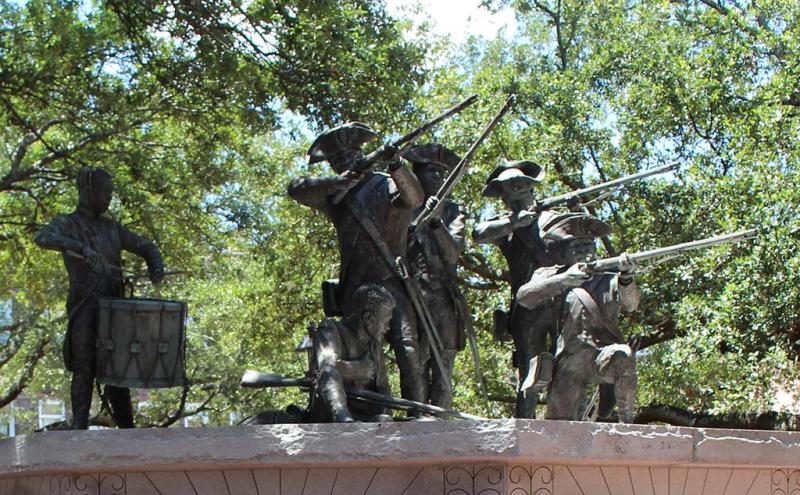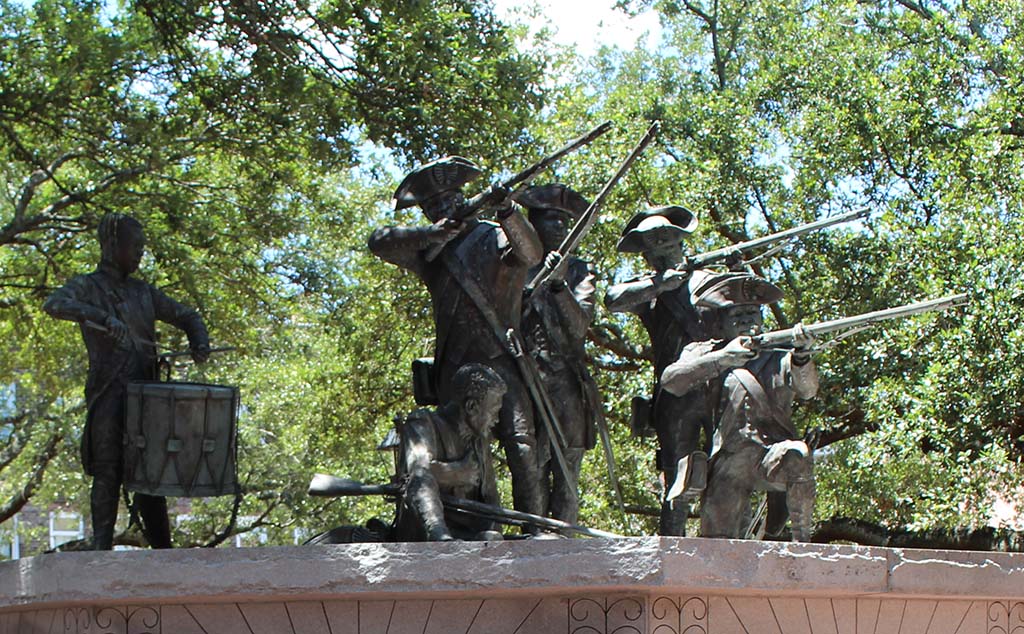Haitian Soldiers at the Battle of Savannah (1779) •
Category: History & Sociology
Via: kavika • 7 months ago • 30 commentsBy: Lea Maguire (BlackPastOnline)


In 2022 my wife and I visited Savannah and made it a point to visit Franklin Sq to view the monument. It is inspiring. The drummer boy in it later became the head of the Haitian army and then the president of Haiti.

 Haitian soldiers at Battle of Savannah statue, Franklin Square, Savannah, Georgia, June 2017 Photo by Michael Rivera (CC BY-SA 4.0)
Haitian soldiers at Battle of Savannah statue, Franklin Square, Savannah, Georgia, June 2017 Photo by Michael Rivera (CC BY-SA 4.0)
The Battle of Savannah, Georgia, which occurred between September 16 and October 18, 1779, became one of the bloodiest battles during the American Revolutionary War. At the time, British forces numbering 3,200 troops had occupied Savannah, then the capital of Georgia, for a year. They were challenged by 600 Continental troops led by General Benjamin Lincoln who were supported by 3,500 French soldiers led by First Lieutenant Count d'Estaing, including 800 troops from Saint-Domingue (later Haiti) and other French Caribbean colonies. The French had agreed to ally with the American Revolutionary forces following the royal ordinance issued by Louis XVI, the King of France, on March 12, 1779.
D'Estaing's troops were mainly composed of colonial regiments coming from various locations such as Guadeloupe, Martinique, or Saint-Domingue. The 800 men from the French Caribbean colonies were organized into a regiment called Chasseurs-Volontaires de Saint-Domingue . These soldiers were des gens de couleurs libres (free men of color) who voluntarily joined the French colonial forces. The gens de couleur were mixed-race men of African and European origin from Saint-Domingue. They were born free and thus were distinct from free slaves or affranchis , who were born enslaved or became enslaved during their lives and then freed themselves or were freed. This distinction allowed the gens de couleur a higher social and political in the French colonial West Indies. According to the 1685 French Black Code, they had the same rights and privileges as the white colonial population. In practice, however, strong discrimination by white French colonial residents impeded the gens de couleurs from fully exercising them.
Nevertheless, due to their in-between status, some men joined the Chasseurs-Volontaires formed after the March 12, 1779 royal ordinance. They became part of the French command which supported the Continental Army in Savannah. In fact, the gens de couleurs outnumbered the 500 American troops at the Battle of Savannah. Their role in the battle was also significant because they were sent in as scouts before the beginning of the hostilities on September 8, 1779. During the course of the battle, they were considered one of the most homogeneous and efficient allied group, fighting the English troops with obstinacy and boldness. But the knowledge the British had concerning the American plan of attack, due to a leak of information given by American deserters, impeded any chance of victory. The Chasseurs-Volontaires military group represented a large part of the 168 killed and 411 wounded soldiers in the French ranks following the battle.
On October 8, 2007, a memorial statue was unveiled in Savannah dedicated to the Chasseurs-Volontaires de Saint-Domingue during the Battle of Savannah. The memorial pays tribute to the significant role these soldiers had during the Revolutionary War and recognizes the support they gave to the founding of the United States.
COPY Maguire, L. (2018, January 28). Haitian Soldiers at the Battle of Savannah (1779) . BlackPast.org. https://www.blackpast.org/global-african-history/haitian-soldiers-battle-savannah-1779/
Source of the author's information:
G. Debien, " Gens de couleur libres et colons de Saint-Domingue devant la Constituante (1789 mars 1790) " Revue d'histoire de l'Amerique francaise , 1950, 211-232 ; Clement Lanier, " Les Negres D'Haiti Dans la Guerre d'Independance Americaine," Revue du Temps , n°52, July 1st 1933 ; Nikki White, " Haitien Memorial Monument Celebration ", August 9, 2016, posted on Savannah official website: http://www.savannah.com/events/event/haitian-memorial-monument-celebration/.
OFF-TOPIC COMMENTS WILL BE REMOVED WITHOUT WARNING.

Tags
Who is online
44 visitors

Instead of damming them lying about thm and chasing them out of the country, we as Americans should honor their contribution to our and their freedom.
Trump, Vanc, and their followers should STFU.
american allies aren't held in high regard by maga republicans ...
It seems that those who fought and did for our FRDOM got NO REGARD AT ALL.
I appreciate those that have served, respect the memory of those that made past patriotic efforts for america and have passed, and revere all of those that made the ultimate unselfish sacrifice for future generations of americans. unfortunately with full disclosure, I can't help but want to wipe my hand on my pant leg when I discover that someone I've met that wore a uniform for this country, or is still wearing one, is a trump supporter. I don't get it.
by the time Cornwallis surrenders his men to La Fayette at Yorktown, the American forces under Washington were fully 25% black men of African decent, including slaves, freedmen and the Hattians and other French colonial units from the Caribbean.
Do you think that any of Trump's ancestors fought for our freedom? Oh, wait, Trump's grandfather was thrown out of his home country for dodging the draft...LMAO and no one in the Trump family has served in the US military.
Sorry, I lost my mind for a second with that question.
LOL. Adding a bit to a well-known proverb: Like (grand)father, like (grand)son.
Yup, bad acorns or apples all of them.
It is possible that Drumpf's ancestors were Hessian soldiers serving the British. Who knows?
LMAO, let's go with that it sounds about right.
Cool history.
Will fall on deaf ears
Yup, bigots are deaf to the truth.
... and blind to reality.
Yup
maga isn't rowing hard enough, we need to cut the tow line ...
This is an interesting story. There is so much history to learn about.
Perhaps our MAGA NTrs should read the history. What am I thinking, they don't care none have commented on the article.
too much work
Thinking gives them headaches.
Good read and thanks for posting. They deserved to be honored and may I say...Thank God for the French!
For sure, Trout.
History is more complicated than the rah rah , and somewhat simplistic, version that we were all taught in school as children.
There is a movement among the political right to simplify it still as being "mainstream" patriotism good, "alternative" patriotism, such as a story about people of color assisting with the founding of the nation , bad.
This war of ideas and historical truths will go on for a long time.
[deleted][✘]
Once again you're having a ''whataboutism'' venture that has nothing to do with the subject matter. As I stated ''off topic will be deleted....
People who disregard the Indian point of view of American history are either a) afraid of what they will find, or b) instantly dismissive of what they will find.
History is just what happened. No one should be afraid to learn what actually was going on.
Can't handle the truth
pretty much
Yes, Black people fought during the American Revolution. But the free blacks from Saint Domingue were not Haitian since Haiti did not exist at that time. The population of Saint Domingue consisted of 32,000 whites, 28,000 free blacks, and 500,000 slaves. Free blacks owned a third of the plantation land and a quarter of the slaves on Saint Domingue. That's the unvarnished history.
While the French did employ free blacks in its military contingent to support the American Revolution, an even more interesting fact is that 20,000 runaway slaves joined British forces as Black Loyalists during the war. The British did protect the Black Loyalists following their loss in the revolution by offering transport to Nova Scotia, land grants, and certificates of freedom. The Black Loyalists transported to Nova Scotia are enumerated in the Book of Negroes which provides proof of their status as free blacks.
Perhaps the history of Black participation in the American Revolution is overlooked because the dominant numbers fought on the losing side. Does anyone know if the history of Black Loyalists receives more attention in Canada?
Not I. It certainly wasn't a topic of Canadian History when I went to school, but that was long ago.
The covers most of you points in your first two paragraphs, thanks for the confirmation of the unvarnished truth.
believe that the black participation is overlooked more because of skin color than any thing else.